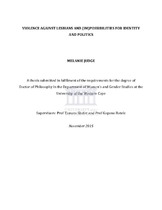| dc.description.abstract | In 2006 South Africa extended marriage rights to gay and lesbian citizens, further signposting their legal inclusion in the post-apartheid order. This inclusion is marked by homophobic murder, signifying the continued social exclusion of those at the sexual margins. The spectre of murder is a political pressure point that has come to dominate local and global imaginaries of queer life in South Africa. This study of violence, sexuality and politics is located in the marriage-murder moment, which signals the paradox of being queer in contemporary South Africa. Against this backdrop, the study explores how lesbian subjectivities are constituted in the discourse of ‘violence against lesbians’; what this reveals and conceals about sexual, gender, race and class identities in post-apartheid South Africa; and what such discursive arrangements render (im)possible in relation to how homophobia-related violence might be politically resisted. Violence against lesbians is approached as a discursive surface for the production of meanings, identities and power, with a focus on its productive dimensions in constituting subjectivity and politics. The contending ways of knowing ‘lesbians’ and the violence they encounter produce the imaginable actions against it. Grounded in feminist post-structuralism, and queer and post- colonial theories, a discourse analysis was undertaken of data from focus groups with lesbian-identified women, media texts, and ‘official’ texts from activist organisations and public institutions. The findings show that homophobia-related violence is a contested discursive terrain wherein normative power relations of sexuality, gender, race and class are both reproduced and resisted. Largely staged around black women as victims and black men as perpetrators, violence is understood in highly sexualised, racialised, classed and gendered registers that draw on apartheid and colonial tropes. In particular, the discourse of sexuality articulates with a politics of race within homophobia-related violence as a knowledge regime. This is seen in the ‘blackwashing’ of homophobia and its discursive mobilisations to make racial attributions – intersected with sexuality, class and gender – about the causes and characters of, and ‘cures’ for, violence. Discursive investments in the spectacle of violence against lesbians, as a particularised form of black and queer suffering, deflect attention away from the social conditions in which violence – as an instrument of power – finds form. The spectacularisation of violence against black lesbians legitimises the ‘naturalness’ of homophobia, disarticulating it from the multiple modes of violent othering with which it is imbricated. In exploring the discursive resources for political agency against violence, the study finds divergent forms of agentic possibility. Some subject positions seek to adapt or regulate gendered behaviour through the promotion of feminised self-care strategies that individualise and depoliticise violence. Others assume homonormalising discourses that bolster gender, race and class hegemonies and their associated queer ascendancies. At the same time, the normalisation of violence and the regulatory practices that seek to constrain lesbian subjectivities are contested. A politics of law and order provides a dominant frame through which violence and conceivable actions against it are constructed. Through a discourse of hate crime, the cause of violence is individualised, and the law and the state are positioned as central to its prevention and punishment. In contrast, activist discourses locate the causes of violence within prevailing power relations that continue to render queers racially and economically precarious. The findings point to how violence against lesbians operates as a marker of queer inclusion and exclusion. Violence against lesbians does the work of race, gender, sexuality and class hierarchisation within the dominant social order. It both settles and unsettles apartheid rationalities, and, in doing so, exposes the contingency and precarity of queer subjectivity in post-apartheid South Africa. The findings suggest that homophobia-related violence charts a story of differentiation, both amongst queers themselves and in their relationship to others. These differentiations have race, gender, sexual and class coordinates which, together and apart, assert particular views of what constitutes queer livability on the one hand, and queer violability on the other. Whilst some discursive frames for countering violence provide liberatory potential, others constitute new forms of regulation, scrutiny and disciplining of queer subjects. The study aims to contribute to the production of knowledge that might, in the face of violence, re-imagine power and advance the political aspirations of marginalised subjectivities. | en_US |

